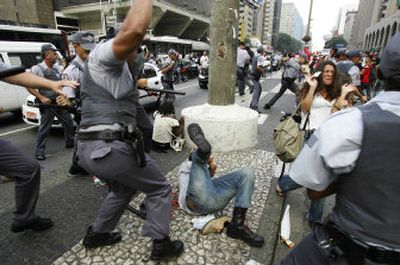Police in Brazil, Colombia clash with Bush protesters

SAO PAULO, Brazil – Police clashed Thursday with students, environmentalists and left-leaning Brazilians protesting a visit by President Bush and his push for an ethanol energy alliance with Latin America’s largest nation.
Protesting students also lobbed rocks and homemade explosives called potato bombs at riot police on a university campus in the Colombian capital of Bogota, where Bush is scheduled to visit Sunday as part of his five-nation tour of Latin America.
In Sao Paulo, officers fired tear gas at protesters and beat them with batons after more than 6,000 people held a largely peaceful march through the financial heart of South America’s largest city, sending hundreds of demonstrators fleeing and ducking into businesses to avoid the mayhem.
Authorities did not immediately report any injuries, but Brazilian media said at least six people were hurt and photographers took pictures of injured people being carried away.
Protesters said scuffles broke out when some radical demonstrators provoked officers and threw sticks at them – but said police overreacted. A police officer who declined to give his name in keeping with department policy confirmed that extremists appeared to cause the confrontations.
After the clash, the protest continued peacefully but with far fewer people. The marchers waved communist flags and railed against Bush, the war in Iraq and the ethanol proposal. Almost all of them had departed by sundown, just as the U.S. president was to arrive in Sao Paulo.
In Colombia, about 200 masked students at Bogota’s National University clashed with 300 anti-riot police carrying shields and helmets, spray-painting anti-U.S. slogans on walls and shouting “Out Bush!”
The Colombian demonstrators called for the scuttling of a U.S.-Colombia free trade agreement signed in November and currently stalled in U.S. Congress, and accused Washington of meddling in the South American nation’s internal affairs by sending some $700 million a year in mostly military aid to fight drugs.
Colombia is beefing up security in the capital for the first visit by a sitting U.S. president since Ronald Reagan in 1982. About 21,000 security agents will patrol the capital.
Asked about the protests, White House spokesman Gordon Johndroe said Bush “enjoys traveling to thriving democracies where freedom of speech and expression are the law of the land. He has a positive agenda here that we believe the people of Brazil and the rest of the Americas will benefit from.”
Some protesters in Brazil carried stalks of sugarcane – which is used to make ethanol – and a banner reading: “For every liter of ethanol produced, 4 liters of fresh water are consumed, monoculture is destroying the nation’s greatest asset.”
Activists from the environmental group Greenpeace warned that increased ethanol production could lead to further clearing of the Amazon rain forest.